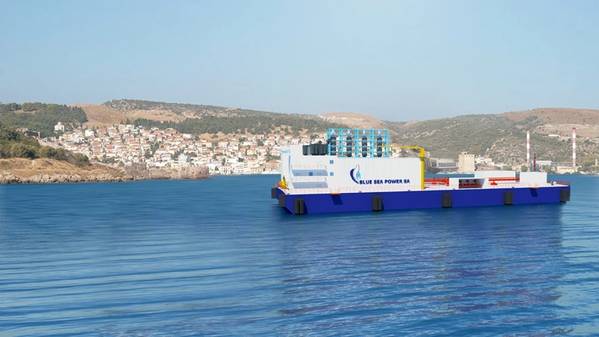
Houlder, the design and engineering consultancy, is collaborating with Blue Sea Power, an integrated energy solution provider as a gas-to-power company based in Athens, to develop three innovative floating LNG-to-power barges (FSRPs).
According to the partners, the FSRP barges, which are set to be operational by 2025, will efficiently provide greener, lower emission baseload and peak power to the non-interconnected islands of Kos, Chios, and Lesvos.
This power will be used when existing renewable solar and wind energy utilization reaches its technical limits. The barges are planned to replace the outdated and inefficient existing diesel and heavy fuel oil power generation infrastructure, while meeting the EU Taxonomy and new Greek Climate legislation.
In the current phase, Houlder will complete the barge designs to a level that will achieve approval in principle by the class society, Lloyd’s Register, and will support Blue Sea Power with the design package for securing suitable tenders from shipyards.
In a previous phase, Houlder completed the key decision studies on the main power generation engine selection, a cargo containment system, design standardisation, GHG reduction & efficiency options, and CAPEX, as well as an environmental study – looking at elements such as the impact on seawater temperature and noise pollution.
To adhere to ambitious EU greenhouse gas (GHG) emissions requirements, the barges must generate power efficiently.
According to EU Taxonomy regulations on GHG emissions for new power plants in Greece, the limit is 270g of CO2 per e/kWh or a 20-year average of 550kgCo2/kWh. Houlder will therefore incorporate innovative, specialist solutions to meet and even exceed these standards.
Blue Sea Power barge solutions are RRF (Reconciliation Recovery Fund) eligible, where EU funding will cover a substantial part of the CAPEX for these additional GHG reduction measures. As the projects are ESG compliant, the team has also leveraged green funding effectively, which it has secured from multiple banks and investors to finance the project, the partners said.
Although proven technologies are used, specific innovations will be included to improve efficiency. The technical solutions include maximising waste heat recovery from the exhaust and using waste heat recovery from the engine’s cooling water system for freshwater generation for export. The barges will also maximise cold energy recovery from the LNG evaporation and use variable frequency drives to improve the efficiency of motors onboard.
The team expects to use a cryogenic carbon capture system onboard the power barges. The engines used will be hydrogen production blend ready to further improve sustainability as the technology to enable this matures and there will be scope to factor and blend bio-LNG and renewable synthetic e-LNG into the supply chain to further reduce GHG emissions.
Jonathan Strachan, Houlder’s ship design and engineering director, commented: “The Blue Sea Power team has been a pleasure to work with and we are looking forward to the outcomes of this interesting project. Floating LNG power barges are greener than traditional power generation infrastructure and, with novel integrated design and engineering developments, we can make energy production even more efficient and sustainable.”
The founding partner of Blue Sea Power, Konstantinos Mitropoulos, said: “We are pleased to be undertaking this innovative floating power solution project with Houlder. We have obtained electricity production licenses from the regulator for Kos, Chios and Lesvos and we have developed a strong approach to provide all three islands with greener, lower-emission power. Houlder has been an invaluable partner. The team has leading technical expertise in sustainability-centric design and engineering and has worked in a practical approach, which has also complemented the Blue Sea Power project delivery expertise.”
Mark Graham, Blue Sea Power Director of Projects, commented: “Whilst the FSRP integrated power barge is a solution that may appear novel in its approach, the power barge utilises proven tried and tested equipment to reduce associated design and construction risks. The FSRP near-shore solution along with its modular design and shipyard construction also presents many repeatability benefit opportunities on CAPEX, OPEX and Construction schedule savings.”
Looking ahead, the partners see potential to develop many more barges and even scale up the projects to efficiently provide other Greek islands and EU locations with green energy.